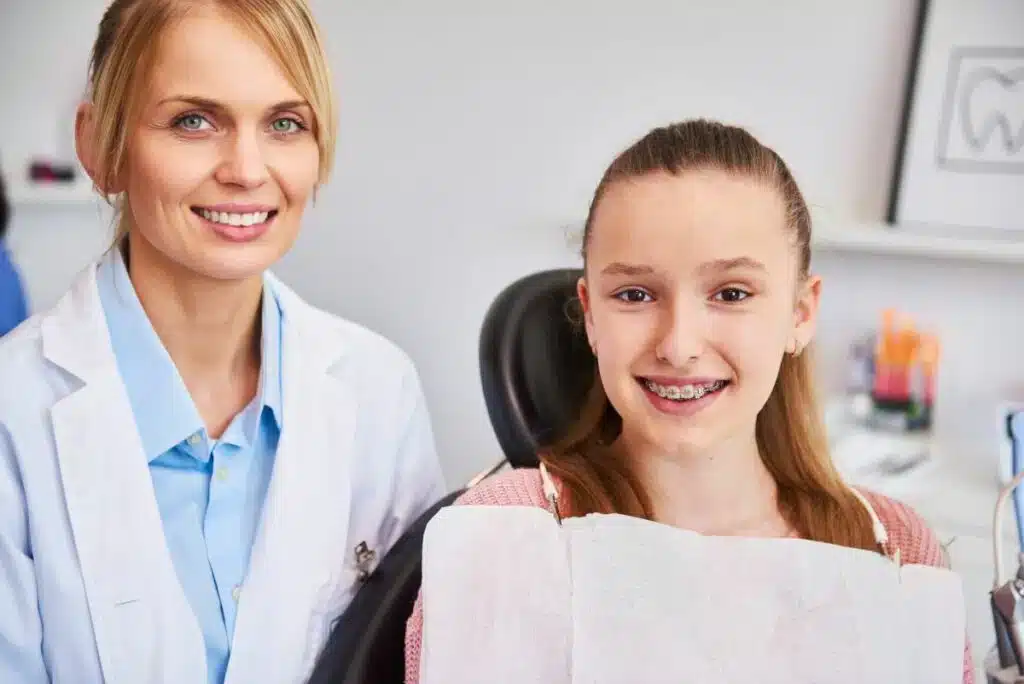The Best Guide To Causey Orthodontics
The Best Guide To Causey Orthodontics
Blog Article
Examine This Report about Causey Orthodontics
Table of ContentsCausey Orthodontics - TruthsCausey Orthodontics Fundamentals ExplainedAn Unbiased View of Causey OrthodonticsThe Best Strategy To Use For Causey OrthodonticsAn Unbiased View of Causey OrthodonticsCausey Orthodontics Fundamentals ExplainedSome Of Causey Orthodontics
What is the difference between a dental expert and an orthodontist? To respond to a concern that is typically asked, both dental experts and orthodontists assist people get much better oral wellness, albeit in various ways. It assists to keep in mind that dental care is an instead broad science with various clinical expertises. All dental experts, consisting of orthodontists, treat the teeth, periodontals, jaw and nerves.
Orthodontists and dental professionals both supply oral look after people. Orthodontists can work in an oral workplace and supply the very same treatments as other dentists. You can believe of both medical professionals who deal with gum and teeth troubles. The major difference is that becoming an orthodontist requires a specific specialty in treating the imbalance of the teeth and jaw.
Little Known Facts About Causey Orthodontics.
An orthodontist is a dental professional that has gone through training to specialize in the medical diagnosis, prevention and treatment of abnormalities in the jaw and teeth. They can also recognize prospective problems in teeth alignment that might create when conditions are left untreated (orthodontist expert).
This includes all the essential education to become a basic dental professional. According to the American Pupil Dental Organization (ASDA), it indicates you will require to have either a Physician of Medication in Dental Care (DMD) or a Doctor of Oral Surgical Procedure (DDS). To put it simply, orthodontists require to finish dental school and after that get an orthodontics specialty education.
Some orthodontists additionally get their masters in craniofacial biology. family orthodontics (https://tupalo.com/en/users/7135924). Several oral schools supply limited orthopedic training and instruction, which is why general dental professionals require to visit orthodontic college after graduation. Orthodontic residency programs supply extensive training for this sort of dental expertise. These programs focus on two particular locations or self-controls: Dentofacial Orthopedics: This research study focuses on assisting teeth and jaw development.
The Basic Principles Of Causey Orthodontics

 These consist of device such as braces, retainers and Invisalign. So, what does an orthodontist do, and what do they concentrate on? The general goal of an orthodontist is to enhance a person's bite. Not everyone is born with straight teeth, and an orthodontist will ensure that people get uniformly spaced straight teeth.
These consist of device such as braces, retainers and Invisalign. So, what does an orthodontist do, and what do they concentrate on? The general goal of an orthodontist is to enhance a person's bite. Not everyone is born with straight teeth, and an orthodontist will ensure that people get uniformly spaced straight teeth.
Fascination About Causey Orthodontics
The American Organization of Orthodontists recommends your very first check up by age 7. You'll need to see your orthodontist if you have a misalignment in your teeth, likewise understood as malocclusion. Additionally, if you notice uneven bite patterns, a slightly twisted jaw, or when your teeth are jammed, you will likely require orthodontic therapy.
In addition, we use flexible therapy timetables, versatile settlement options and a fun, satisfying experience.
An orthodontist is a dental professional trained to detect, avoid, and treat teeth and jaw irregularities. They correct existing problems and are educated to determine issues that might establish in the future. Orthodontists collaborate with individuals of all ages, from children to adults. People often connect a best smile with excellent health.
All about Causey Orthodontics
Malocclusion, or misaligned teeth, can lead to dental problems, consisting of dental caries, periodontal condition, and challenging or excruciating eating. Yet not everybody is birthed with straight teeth. If you have a bad bite or large spaces between your teeth, you may desire to seek advice from a dental expert concentrating on orthodontic care.
(Picture Credit Score: DigitalVision/Getty Images) Orthodontists utilize taken care of and detachable dental tools, like dental braces, retainers, and bands, to transform the placement of teeth in your mouth. Orthodontic therapy is for dental problems, including: Crooked teethBite troubles, like an overbite or an underbiteCrowded teeth or teeth that are too much apartJaw misalignmentThe objective of orthodontic therapy is to improve your bite.
Some Ideas on Causey Orthodontics You Should Know

All orthodontists are dentists, however not all dental practitioners are orthodontists. Orthodontic residency programs provide extensive, concentrated guideline for dental experts. They concentrate on two areas: Exactly how to properly and safely relocate teeth Exactly how to correctly lead growth in the teeth, jaw, and faceOnce an orthodontist has actually finished training, they have the alternative to become board licensed.
Malocclusion leads to tooth congestion, an askew jaw, or irregular bite patterns. Malocclusion is normally treated with: Your orthodontist attaches metal, ceramic, or plastic square bonds to your teeth.
More About Causey Orthodontics
If you have just minor malocclusion, you may be able to make use of clear braces, called aligners, rather than traditional dental braces. Some individuals require a headwear to help relocate teeth right into line with stress from outside the mouth. After dental braces or aligners, you'll require to wear a retainer. A retainer is a customized device that keeps your teeth in place.
Report this page